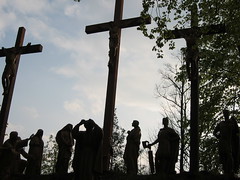
I believe in science (at least, when it's done right). I believe almost all of God's work is done naturally, not supernaturally, and is revealed to us in the same fashion, through application of our own powers of observation and reason. Even that which has traditionally been called "God" is a construct of natural human apprehension, a mere figure of another reality that cannot be described or experienced in human terms.
Now, I do not necessarily deny that God is capable of acting supernaturally. Science can only explain the natural, not the supernatural. But it's really, really rare and unusual for that to happen. Almost everything in human experience can be understood and explained in natural terms, even if much of it has not yet been understood or explained.
I believe that God acted naturally, not supernaturally, when he inspired human observers to write down their experience and understanding of God. And I believe he did so again when he inspired others to assemble those writings and bestow on them the status called "scripture". And he does so again each time one of us picks up a book of scripture and tries to draw meaning out of it. I believe scripture has true, powerful and timeless things to teach us about God, handed down to us from those who first apprehended these things. However, by no means does that make scripture perfectly, consistently, absolutely, thoroughly, literally, and inerrantly true in every word and detail, as some would claim. Scripture is still a human witness, not a supernatural revelation.
Do I believe that God in reality acted supernaturally in every instance where scripture portrays him as having done so? No, although I don't deny the hypothetical possibility that he might have done so in some of those instances. But whether he did or not in any one instance, all these instances are first and foremost one human being (the author) earnestly telling a story to another human being (the reader). When scripture portrays a supernatural occurrence, it's as if the author is slapping your face and shouting, "HEY! WAKE UP!! I'M TELLING YOU: THIS IS IMPORTANT!!! SOMETHING REALLY UNUSUAL IS GOING ON HERE!!! YOU'D BETTER TAKE THIS SERIOUSLY AND FIGURE OUT WHAT IT MEANS!!!!"
So, in the middle of Holy Week, we might ask, what does the Resurrection mean? Did Jesus's corpse literally, physically, come back to life after death? I can't say, categorically, no, but I deeply doubt it. God may be capable of supernatural things, yet it would be really, really unusual, so skepticism is warranted and understandable.
However, something most people on either side of the literal question miss is that, whether he did or he didn't, the meaning of the story is exactly the same: Long ago, Jesus the man revealed something new about God to us. God can be present with and among us. God somehow entered the human condition to be with us. Jesus the man lived and he died. But the Body of Christ rose again, and remains alive eternally.
And here's the most important part, the deepest meaning of the story:
we, the gathered community of faith, are now that Body, whether we call ourselves by that name or any other.
Christ has no body but yours,
No hands, no feet on earth but yours,
Yours are the eyes with which he looks
Compassion on this world,
Yours are the feet with which he walks to do good,
Yours are the hands with which he blesses all the world.
Yours are the hands, yours are the feet,
Yours are the eyes, you are his body.--St. Teresa of Avila


